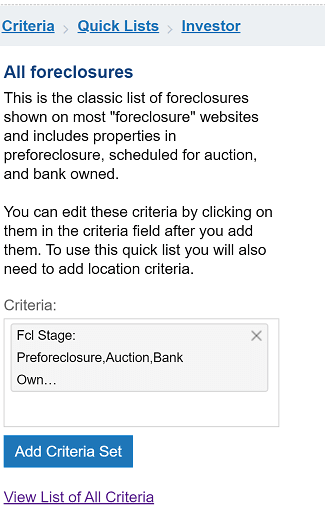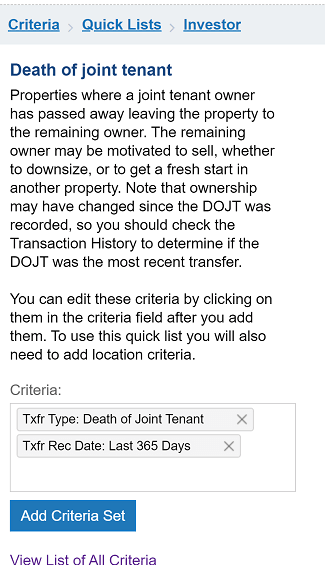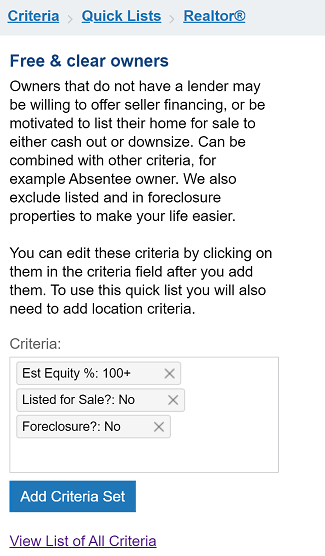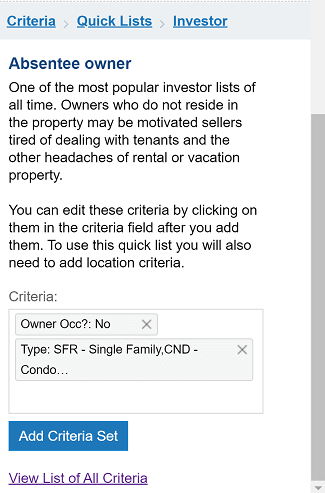How To Find Motivated Sellers - Learn How the Pros Do It

Want to find motivated sellers? You’re not the only one.
For better or worse, motivated seller lists are popularized by thousands of real estate gurus and lead generation services that target new real estate investors and agents.
Unfortunately, many of those new investors and agents discover that these motivated seller lists don’t yield immediate, effortless results.
And yet motivated seller lists remain a core strategy for tens of thousands of successful and seasoned real estate professionals.
So why are experienced, data-driven real estate professionals able to consistently discover new deals and clients pursuing motivated seller strategies year-over-year?
“Professional” typically means someone who’s learned from a making lot of mistakes and survived to become good at the strategy, tactics, and execution that leads to success.
In other words, it's not just about the list, but how you use that list that produces results.
That professional approach is what we aim to cover here:
- We’ll cover some of the most common strategy mistakes made in marketing to motivated sellers that lead to wasted time, money, and effort.
- We’ll uncover how the seasoned data-driven pros tactically combine the power public records with their local market expertise to generate the leads that drive new deals and convert new clients.
- And we'll cover how persistent and consistent execution of outreach (your brand impressions) ultimately leads to success.
Why find motivated sellers?
Let’s back up. Why find motivated sellers? Fundamentally there are three attractive characteristics that drive the desire to pursue motivated sellers:
- “Easy” to identify
- Faster transactions
- More profit
Context and timing, therefore, is everything.

Understand the motivation behind a motivated seller
So, why would a seller be motivated?
There can be a lot of different reasons, however, distress is the most common. Opportunity, however, is also very common and just as valuable.
More often than not, motivated sellers have just experienced, or are currently experiencing, a life event that has created the need and urgency to sell their home. They’re looking to sell their home sooner rather than later. Here are just some of the common reasons people end up highly motivated to sell their property. Use your creativity to think of other situations.
- Change in income: An owner might have lost a main source of income and needs to downsize, or they may have increased their income and are impatient to enjoy a new home that better fits their current needs or lifestyle.
- Relocation: A new job in a new location often leads to the motivation to sell quickly.
- Life circumstances Changes in marital status, the birth, health, or death of a family member often results in sellers being motivated to make a timely move.
- Home is nearing foreclosure, or in foreclosure: When sellers at or near foreclosure, they are often “motivated” in the sense that a legal process forces a transaction. The 5 D’s of Foreclosure, Death, Disease, Drugs, Divorce, and Denial are more often than not the precursor.
- Neglect, vacancy, and extensive repairs: Not everyone wants to tackle a project. And some renovations or repairs outsize the current owner such as fire, water, or mold. Many homeowners would rather leave that up to the buyer and sell their home as-is.
- Home is no longer the right size: Sellers might need to upsize or downsize. While there isn’t always a time crunch on this issue, sometimes there is.
- High equity: Some sellers might be chomping at the bit to use their mass amounts of equity for other purposes: a smaller home, a different investment, a lifestyle change. A sudden pessimism about the local market creates an urgency to sell while they can.
- Environment, natural, and unnatural disasters. Whether it’s rising sea levels, wildfires, earthquakes, or other acts of mother nature, rapid changes to the environment or a local economy due to environmental or natural disasters lead to massive motivations. Or it can be unnatural such as pests, fire, or builder malfeasance.
- Crime. Often the victims of crime, or owners in neighborhoods with rising crime levels are motivated to sell.
- Zoning and new projects. A school zone change can lead to 100s of unhappy parents. Often a new construction project or zoning for a new construction can motivate owners to get out before the neighborhood sees a rapid decline in value. Freeway and airport expansions have consistently alerted the value of neighborhoods for better and for worse.
How to find motivated sellers in two methods
Because there are so many reasons why a seller might be motivated, there isn’t just one way to find them.
There are two main ways to find these types of sellers, and we recommend that you do both.
Method 1. Public Records
- What this is: You can use a platform like PropertyRadar to craft lists dozens of popular lists such as death of joint tenant, foreclosure, owner age, equity, etc. Many of the clues to finding a motivated seller are revealed through public records.
- Pros: It’s quick to discover lists of motivated sellers in your area. Depending on your market, others might not be using this strategy.
- Cons: Lots of newbies might be doing the exact same thing (based on what gurus teach them), meaning there’s more competition.
- How the “Pros” win: Beat the newbies (and pros) with empathetic marketing and selling. Learn the 200+ criteria that are used to target properties and their owners. (You can’t be a good cook without knowing what spices to use and when.) Persistent and consistent outreach over a longer period of time. Connect across channels: Use direct mail, phone, email, and even consider in-person contact.
Method 2. Public Records + Other Sources
Many of the life events that indicate the propensity for an owner to become motivated are not in the public record. But that doesn’t mean that they can be identified and combined with public records searches to discover, understand, and connect with them.
- What this is: Social media and news media are great resources. Your social network, too. For example, a large employer announces layoffs. By using LinkedIn you identify who may be affected. Combine that list with all of the public records intelligence to segment based on equity, home type, age, etc. And every year parents find themselves empty-nesters with expensive college tuition to pay for and downsize.
- Pros: Often the most successful lists. These prospects are unique to you as the result of your efforts to cultivate “something from nothing”. They can be individual cases that you’ve heard of (a death, a divorce, a move) or market trends that you know of (mass layoffs).
- Cons: There’s often not a quick and easy way to pull this information. You’ll need to invest time. So processes and automation become important as you need to free up time to focus.
- How the “Pros” win: Look for opportunities at social events, in the news media, on social media, and 100s of other unique sources to uncover hyperlocal market events, patterns, and trends. For example, every year, somewhere there’s a big winter that leads thousands of owners to want to sell fast and move to a warmer location. Become proficient in identifying that intelligence and develop the process to combine it with public records to create unique lists with specific motivations you can assist with.
Method 1: Public Records
Let’s dive deeper into the first method, and see some use cases.
Foreclosed properties
People dealing with a foreclosed property make for very motivated sellers. And using public records to find foreclosed properties is a sure bet to finding these motivated sellers.
Unfortunately, searching through public records data can be a messy, time-consuming process. But PropertyRadar makes public records more useful and actionable by making sense of that data and enriching it to make it more useful.
You can draw a map shape of your market, and then add “All foreclosures” as criteria, or choose from different statuses of foreclosures or different property prices.

Death of joint tenant
You can also use “Death of joint tenant” as criteria. This is a life event that can be made even more stressful when the homeowner is trying to maintain the property in the way they did when their loved one was alive. Tread lightly and with tact. The aim is to help out a homeowner who might be able to live a better life if they sell their current home.

Free and clear owners
Free and clear homeowners are a popular target for finding opportunistic motivated sellers. Not all of them will be interested in selling and making all of that equity liquid, but some will. You just don't know when. They might be experiencing other personal motivations that you don’t know about, such as the desire for a lifestyle change. Persistent and consistent outreach is vital to pursue free and clear owners.
Search for homeowners with 100% equity in your area. Refine that with other criteria such as property characteristics, owner demographics, length of ownership, and proximity to other hyperlocal markets changes.

Absentee owners
Finding absentee owners can often make for perfect motivated sellers list. Why? They could be tired of maintaining a rental, or they might have a vacation property that they can no longer afford. Or they're no longer getting the value out of that vacation property, typically after their children have grown and left the nest.
You can search for absentee owners by first selecting your location and then adding that criteria when building a list inside of PropertyRadar.

Method 2. Combine your expertise WITH public records
Now let’s take a look at some ways to utilize the second method by combining your market expertise and personal network with public records.
Divorce
A friend or family member might tell you that someone they know is getting a divorce. Or you might see a post on Facebook in your newsfeed from an acquaintance, or maybe in a local Facebook group.
When you know of someone who is getting a divorce soon, you can then qualify that lead by looking up the owner name or address of the property that they own, and see if they meet your criteria for an ideal client or deal.

Upcoming move
Just like with our divorce example, you might hear from your personal network of someone who is planning to move. Once you hear of an opportunity in person or on social media, you can then vet that lead by looking up their property to determine if it’s a fit for your business. Age and demographics in context to local market changes are very common. Even the weather!
Hiring, firings, company closures, etc.

There could be things going on with some of the big employers in your area. Is an employer building a new complex? Is a company closing down? Have there been mass layoffs? With tactful and empathetic messaging, you can reach out to potential motivated sellers.
Here are some examples:
- Search LinkedIn for people announcing their new job at a company in your area
- Search LinkedIn for employees at a big company in your area but who are currently located in a different town (they might be relocating soon)
- Search LinkedIn for employees at a company with large layoffs (search within the relevant departments
Once you’ve found the right people, you can look them up inside of PropertyRadar to see if they’re homeowners. And if they are, you can learn more about their property and see if they would be a fit for a potential listing or deal.
Sudden increase in property value
If you’re in a market whose property values have rapidly increased in the past five years, then there are likely hundreds of sellers in your area who might be motivated to take advantage of the upsurge.
Use your knowledge of the market to target neighborhoods with the most demand from new buyers. Inside of PropertyRadar, you can layer on additional criteria, such as age and equity percentage, to try and find empty nesters or others more likely to see.
For example, here’s a list of homeowners with 30% equity or higher who are 45 years old or more. With PropertyRadar, you can layer on criteria into one list, and create separate lists.

How to contact motivated sellers in your market and avoid costly mistakes
Once you’ve discovered lists of motivated sellers, how do you contact them?
Powered by public records, PropertyRadar has owner contact information for each property owner you can search.
This information is automatically stored in your lists. You can export that information, or integrate it with your CRM, power dialer, or direct mail provider using our Zapier integration.
For investors and realtors who want to contact motivated sellers, we recommend these channels:
- Phone
- Direct mail
- Direct social media messages
- Door knocking
PropertyRadar has the contact information you need to use those channels for the prospects on your list.
You’ll have the best results if you segment your lists strategically. For example, the way you reach out to the absentee owner of a likely vacation home is different than how you would communicate with someone whose property is likely to be a rental.
And for each dynamic mailing list you create, you can set up triggers so that when a new lead matches the criteria of a list, a direct mail postcard is automatically sent before your competition even knows the opportunity exists. That's winning by being proactive.
You can also win by thinking of things that others aren’t doing, more often than not that involves empathy. Put yourself in their shoes. Would you respond to you? Because so many “motivations” are the result of distress, those who take the most care in helping come out on top.
For example, when there’s a death of a joint tenant, many people think to contact the surviving spouse, but few would think to research and contact the children, who are often the better advocates and decision-makers in this difficult time. Again, if the role were reversed, what would you respond to?
Persistency and diversity lead to consistency. Budget and plan to contact owners consistently over a period of time.
Newbies aren’t consistent. They hit one large list with a hail mary one-time outreach with poor messaging, no empathy, and expect leads to rain from the sky. When they get no results, they give up.
Professionals know better. Frequency and recency of outreach trumps list size every time.
It’s always better to make multiple impressions to connect over time than just one pass.
When you contact someone the first time, they might not be motivated at that moment. But circumstances change, and timing is everything.
More importantly: They’re not just working one list, but multiple lists and refining their messaging over time.
Some lists are worth contacting weekly, some maybe 2-3 times a year.
Ultimately, developing your brand and reputation over time, and across channels, is what separates the pros from the beginners.


